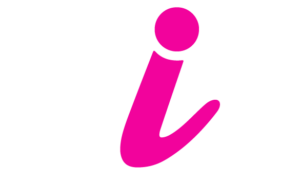The Power of Networking for Sales Success

Success in sales doesn’t just look like closing deals; it’s also about building a robust network that can support and propel your career forward. Networking is crucial for sales success, and for sustained achievements, offering opportunities for mentorship, partnership, and personal growth. Research from November 2023 shows that “companies whose real-world employee connections put them at the center of their professional communities performed better than peer companies whose workforces were less well-connected and, as a result, on the periphery of the same community.” Understanding the Importance of Networking Building a strong network is a powerful strategy that can significantly impact your sales career. By connecting with others, sharing knowledge, and leveraging relationships, you gain access to valuable resources, industry insights, and potential career opportunities. Networking is essential for sales success, as well as continued growth and achievement in your field. Overcoming Challenges in Networking Women of color often face unique challenges in networking, such as underrepresentation, implicit bias, and a lack of relatable role models – women of color only hold 10% of senior manager and director-level titles and 5% of C-level roles across all industries and departments nationwide. It’s not uncommon to feel like the only person in the room who looks like you, which can be intimidating and isolating. That’s why SIS was created – to build a community where women who felt alone in their professional environments could find support and solidarity. Strategies for Overcoming Challenges: Find a Mentor: Seek out mentors who can provide guidance and support. Mentors can offer valuable advice and help you navigate your career. (Hint: the majority of SIS members hold senior-level roles in their companies – what powerful women to learn from!) Join Professional Groups: Engage with professional organizations like SIS that offer networking opportunities tailored to your needs. Leverage Online Platforms: Utilize LinkedIn and other social media platforms to connect with industry professionals and join relevant groups. Effective Networking Strategies Networking Outside Your Workplace: Building Genuine Connections: Focus on creating authentic relationships rather than superficial contacts – don’t seek out people just to sell to, but to prioritize a lasting and genuine connection. These more sincere, less self-serving connections lead to long-lasting professional relationships; even if they don’t buy from you, they may be willing to refer their network to you if they trust you! Attend local industry meetups, engage in community events, and seek out meaningful interactions. Utilizing Social Media: Use platforms like LinkedIn and Instagram to connect with industry leaders, participate in discussions, and stay updated on industry trends. Regularly share insightful content, join relevant groups, and engage with posts from other professionals to increase your visibility. Attending Industry Events: Participate in conferences, webinars, and networking events, such as SIS events, to meet new people and expand your network. These events offer unique opportunities to learn from experts, discover new trends, establish connections with potential clients or collaborators, and maybe even find your next career opportunity! Follow-Up: After meeting new contacts, follow up with them to maintain and strengthen the relationship. Send personalized messages, set up coffee meetings, or invite them to relevant industry events to keep the connection active. Networking Inside Your Workplace: Climbing the Ladder: Networking within your organization can lead to promotions and career advancements. Connect with colleagues across different departments to broaden your internal network. Attend company events, join internal committees, and actively participate in team projects to showcase your skills and commitment. Expanding Horizons: Build relationships with peers in other roles or departments to gain a broader perspective and potentially transition into new positions. Engage in cross-functional projects, seek opportunities for collaboration, and be open to learning from colleagues in different areas. Long-Term Relationships: Cultivate long-term relationships with colleagues and leaders who can provide ongoing support and mentorship. Regularly check in with mentors, offer support to peers, and participate in mentorship programs to foster a supportive work environment. Leveraging SIS for Networking The SIS community is thriving and ready for you to jump in, learn, meet people, and grow your career. Membership is what you make of it, and everyone in the community wants to see each other succeed. A rising tide lifts all boats, and by supporting each other, we all grow stronger together. Community Benefits: Exclusive Events: Access to members-only events that provide networking opportunities with industry leaders and peers. Mentorship Programs: Opportunities to find mentors and become a mentor, fostering a supportive environment for career growth. Active Forums: Engage in discussions, share experiences, and gain insights from other members in our exclusive SIS-members-only platform. Building Your Personal Brand A strong personal brand can enhance your networking efforts by making you more recognizable and memorable. It showcases your expertise and values, making it easier for others to connect with you. Tips for Building a Brand: Professional Online Presence: Develop a consistent and professional online presence on platforms like LinkedIn. Ensure your profiles are up-to-date, highlight your achievements, and use a professional photo. Share Industry Insights: Regularly post and share valuable content related to your field to position yourself as a thought leader. Write articles, share relevant news, and provide commentary on industry developments. Engage with Others: Actively engage with others’ content by commenting, liking, and sharing, to increase your visibility. Participate in discussions, congratulate others on their achievements, and offer support or advice when appropriate. Networking for Career Advancement Networking can be a powerful tool for career advancement in sales, whether you are seeking a promotion, transitioning to a new role, or looking for mentorship opportunities. Building strong relationships within your organization can provide the support and guidance needed to advance your sales career. Key Benefits: Promotions and Career Growth: Effective networking can lead to recognition and promotion opportunities. By demonstrating your skills, building a strong professional reputation, and connecting with decision-makers, you can enhance your career prospects. Support and Guidance: Long-term professional relationships provide continuous support and valuable career advice. Having a network of trusted advisors can help you navigate challenges, identify new opportunities, and make informed decisions. Mentorship
#SeeingIsBelieving: “Don’t ever feel like you can’t do it!”
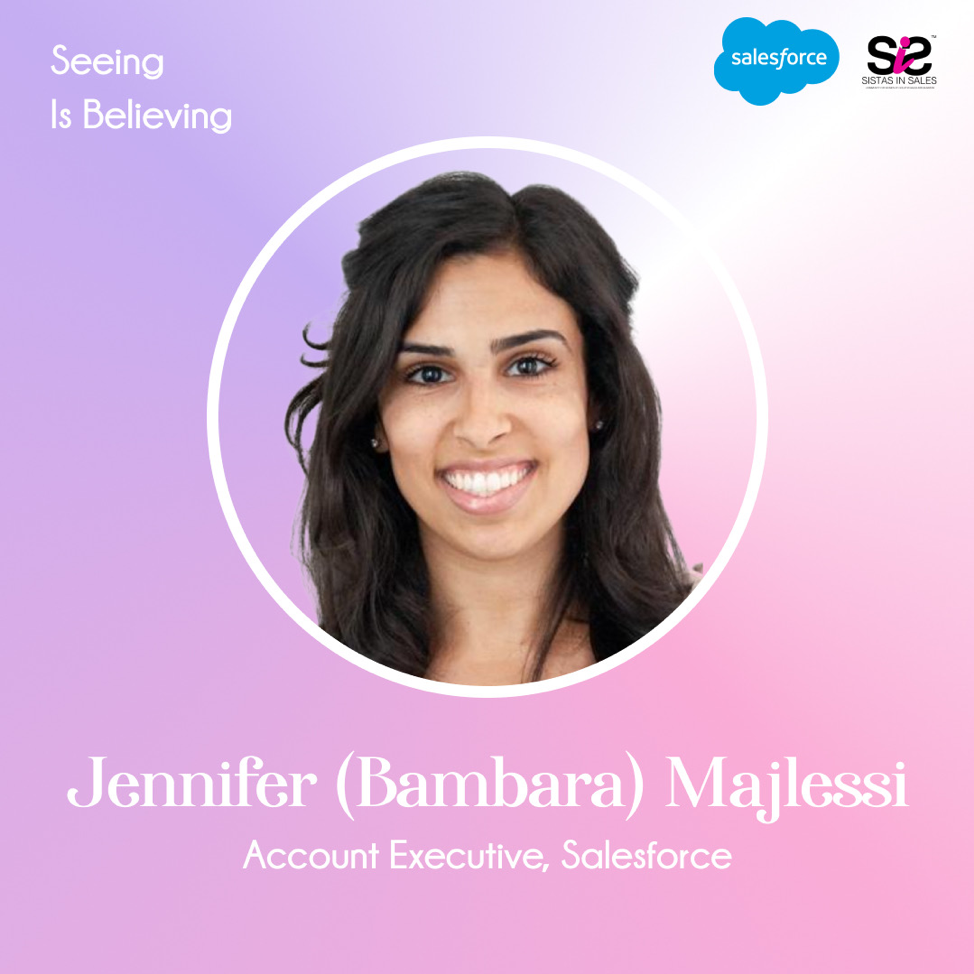
Jennifer (Bambara) Majlessi is an Account Executive at Salesforce. She shares: her journey, how she’s pursuing what she loves most, the pros and cons of startups, and how she’s learned ruthless prioritization. Jennifer feels strongly that sales is going through a bit of a renaissance period and that relationships matter more than ever before. Read on for Jennifer’s advice on success in sales. Jennifer initially had a love for finance and we explored why she decided to transition to sales. I’m a MidCommercial Account Executive, with a specialization in High Tech at Salesforce. I’ve been in this role since March 2020, almost two years now. I studied finance at Lehigh University and graduated post-recession during a turbulent time. I vividly remember entering my core curriculum at the start of my junior year, during the onset of the recession, and my professors said, “If you don’t absolutely love finance, now is the time to switch majors.” I loved numbers and my mom was a trader on Wall Street, so she was big into math as well. But I’m very personable, so sitting in front of Excel spreadsheets, not talking to anyone all day, didn’t feel quite like it fit. I needed a balance of both worlds and sure enough numbers + social = sales. Upon graduation, I took on a sales role at a leading global provider of mission-critical data and insights to help companies accelerate revenue and manage risk. This was an impactful role during a recession as companies looked to protect themselves in order to survive. I began as an intern, cutting my teeth on cold calling, obtaining guidance from great leadership, and absorbing everything I could from successful account executives around me. I knew I had proven myself when I got the opportunity to take on a million-dollar book of business while a coworker was out on temporary leave. This allowed me to flex both my social and math skills which I loved. At this point, I was either headed into investment banking or into sales, and it was then that I realized the relationship building side of sales offered me more fulfillment. From there, I took on a role with the new customer acquisition team and set out to establish, manage, and grow my own relationships and book of business. You made a leap to a startup; how did that happen and what did you learn from that experience? Once you get the bug for building, it’s only natural that you consider the startup world. I wanted to know more about what was happening around me and about my customers. I wanted insight into the full customer journey, from how they are marketed to, to their influence on and use of our products. That was when I decided to join a startup specializing in point-of-sale systems that is now powered by Lightspeed. There were about 90 people at that point: few were women, fewer were in sales, and even fewer were women from underrepresented groups. The culture was welcoming and promoted friendly competition. The sale itself was very fast-paced and transactional, and our SaaS platform was powering SMBs to take back main street. We were helping them get back to what they loved about running their business, while providing better insights and faster sales captures. It was awesome to be a part of the digital transformation, migrating entrepreneurs from cash registers to iPads and completely changing the way they ran their business. After being promoted into a senior individual contributor (IC) role, I had my sights set on leadership. I still enjoyed interacting with our customers and wanted to remain close, so I took on a hybrid role (player/coach) which allowed me to lead from within, managing and selling throughout. This allowed me to gain credibility as a leader, being in the thick of it with them. It also allowed me to liaise between sales and product/marketing to inform our product roadmap, GTM strategy and shared valued perspective of our customers. Salesforce is quite the departure from the startup world, what was it that attracted you to Salesforce? Throughout all my sales roles, the one constant was Sales Cloud and working on the Salesforce platform. Best in class indeed, and it powered all of my sales efforts as an IC and a leader. In every business review, I was asked about my growth goals and they always included learning more about the power of Salesforce. I wanted to build my own reports and truly geeked out on the product. I thought, “I’ve always been passionate about this product. Why don’t I make it my job to learn more about it and share its value with others?” So, I transitioned back into the corporate world as an IC to learn the product and refine my skills, planning to keep leadership top of mind. Salesforce also felt like the right culture. They care about the community and their employees. Our work here is a true team effort. There is no room for a lone wolf because we win and lose as a team, together. I want to contribute and see my contributions, but I also want our collective success. In terms of learning, I wanted to hone my skills as a sales professional and knew I would be learning from, and among, the best. Thinking ahead about my future and career, I saw endless opportunities and a path to growth. Honestly, the pace of this organization feels like a startup, but carries the reputation and resources of an established brand. That’s something I didn’t want to lose, I love agility. We joke about the ever-changing product names and speed with which new products launch, but it is truly impressive. That’s the kind of energy and speed I loved in a startup – that energy with the expertise, resources and collaboration that come with defining a solution as a team, felt like the best way to support our end users. And Salesforce encourages you to bring your whole self
Bringing Your Authentic Self to Work
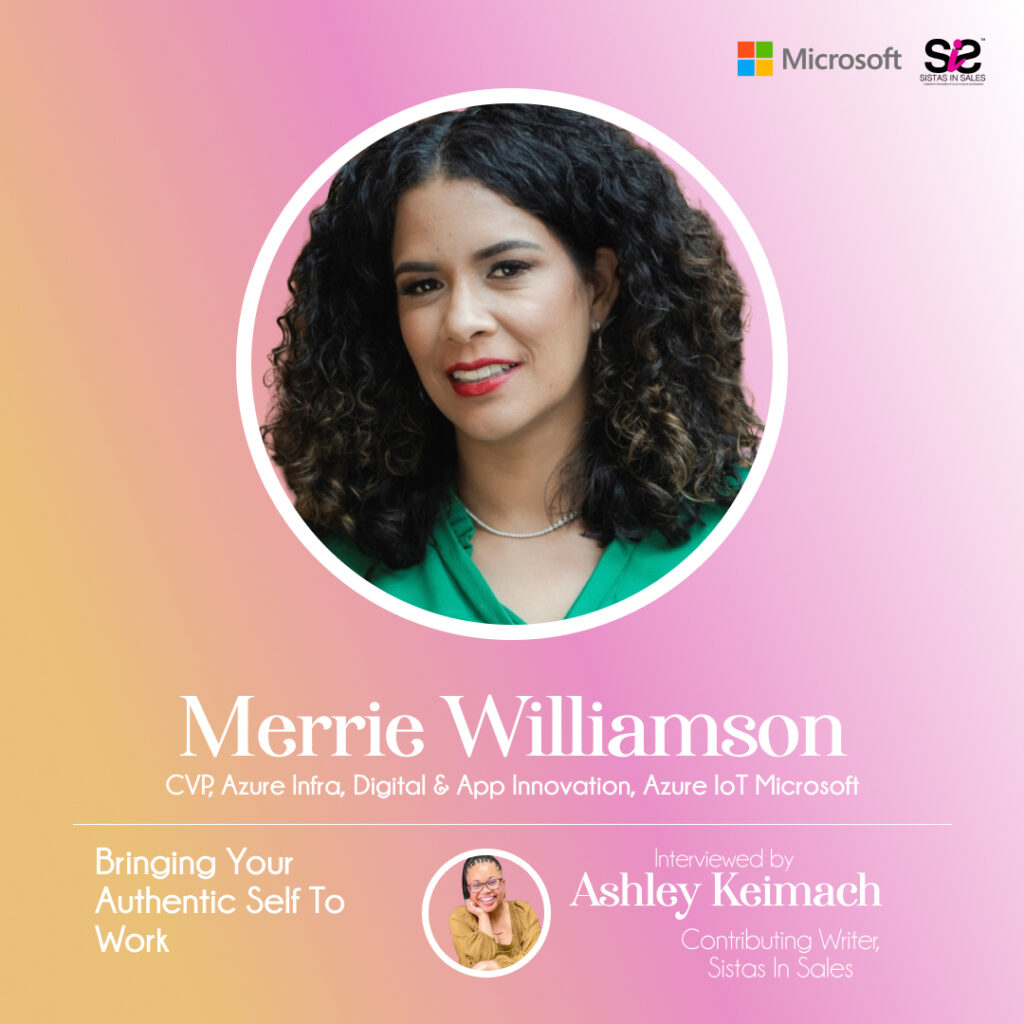
Merrie Williamson Corporate Vice President of Azure Infrastructure, Digital Applications and IoT at Microsoft About Merrie Merrie Williamson is the Corporate Vice President of Azure Infrastructure, Azure IoT and the newly launched Digital and Application Innovation solution area in the Microsoft Customer and Partner Solutions business group. She is responsible for Microsoft’s global commercial sales, strategy and execution for the core multi-billion dollar Azure business. As Microsoft and their customers continue to transform with digital solutions, the requirements for an ever more agile sales models with deeper investments in technical breath and customer compassion are required. Merrie joined Microsoft in 2019 as an executive leader with deep roots in building cloud technologies and driving global cultural transformation. Before joining Microsoft Merrie worked in the technology sector for over 20 years. She directed strategic investments in products from technical inception to launch, typically in a cutting-edge area for the business, bringing together organizations, corporate partnerships, and leading sales teams to deliver revenue. With a background in Manufacturing Engineering, Merrie is ardent is passionate about finding solutions for the under-representation of women and underrepresented people in STEM and sales. Merrie is also passionate about service and community. She has served on two not-for-profit boards in the Seattle area. Starting in the early 2000s, with Seattle MESA (STEM pipeline for Seattle underrepresented schools) and then on the board of the Seattle YMCA (Homeless youth, special needs foster care, low-income childcare, and health and wellness) where she volunteered for 10 years, including as chairwoman. More recently, Merrie had the opportunity to serve for over two years on a private board for Urban Airship, a start-up technology company in Portland. She shares her community service mindset with her husband Derek, who has served for over 25 years in the Seattle Fire Department and is currently an Assistant Chief. Her life is shared by her wonderful children Evan and Sophie. Together they are sporty and musical. Merrie is a voracious reader, amateur soccer coach and player, and unsuccessful gardener. In recent days, Merrie has used her platform on social media to speak out about the Black Lives Matter movement, hoping to address this as a human rights challenge by building a shared understanding and steps to inspire action. Connect with Merrie on LinkedIn. The Interview: We began by asking Merrie to tell us a little bit about herself. “I am a black woman in sales. Back in my college years, I knew I wanted to do deeply technical problem solving types of things with my life…I thought I was a brilliant product person who built the best things on the planet and sales was just this easy cheesy job that people like me don’t go into – but it’s hard and] it’s something I wish more people understood.” Merrie studied engineering in undergrad and continued on with this focus for her Masters Degree. After finishing up school, Merrie joined the workforce as a Technical Program Manager at Intel. While working at Intel, Merrie grew both as an engineer as well as a leader. “I learned a lot about the world of technology and high tech and how to develop myself as an engineer. I learned how to marry my authentic view of the world into my management experiences and eventually senior leadership positions.” Before joining Microsoft, Merrie worked in the technology sector for over 20 years. She directed strategic investments in products from technical inception to launch, typically in a cutting-edge area for the business, bringing together organizations and building corporate partnerships. Merrie made a career pivot while at Intel when she stepped into the role as Global Senior Director for the Datacenter Sales & Marketing Team. While in this position, Merrie helped grow their traditional sales organization from a hundreds-of-millions sales pipeline, to a multi-billion dollar sales pipeline. “Where I am now [in sales is focused on] how do I help provide that empathy bridge between the product teams that I work with…while designing and partnering and coaching our sellers all over the world doing cloud sales – and how do I maintain the speed and the growth that the company requires to meet our shareholder and external commitments. I’m still on my own learning curve in sales.” Over the course of her career, Merrie has managed to evolve and grow with each new opportunity presented to her. She has maintained a presence in her community through serving on various boards and she has also raised two children all the while climbing the corporate ladder. When asked how she continued to evolve as a woman in leadership, she shared the following insights: “As I look back over the first 10 years [of my career], my evolution was almost survival. I was focused on how to show up and manage myself as one of very few women, and also perform at the highest level I can perform. I think my next evolution was focused on how do I then turn into the woman manager that I want to be that’s authentic to me?” “My third evolution, now as a Senior Leader, an executive, has kind of unleashed the courage for me. I feel like I’m at a position now where I’m still learning and listening but it’s all about being an amplifier of things that people may not want to address full steam, whether that’s business…or culture, and community, and the world, and hard things.” With so many accomplishments, Merrie has learned firsthand the importance of evolving oneself to meet the new demands each new role requires. She has mastered the art of looking within, while simultaneously assessing her environment to determine which skills and resources she needs to tap into to catapult herself into a new evolved person. In her personal evolution, Merrie acknowledges how critical workplace culture is on one’s professional development. When asked to describe the workplace culture at Microsoft and what sets it apart, Merrie pulled back the curtain and provided insight into the beliefs that have reverberated throughout the entire company.
Building Your Personal Brand as a Senior Seller
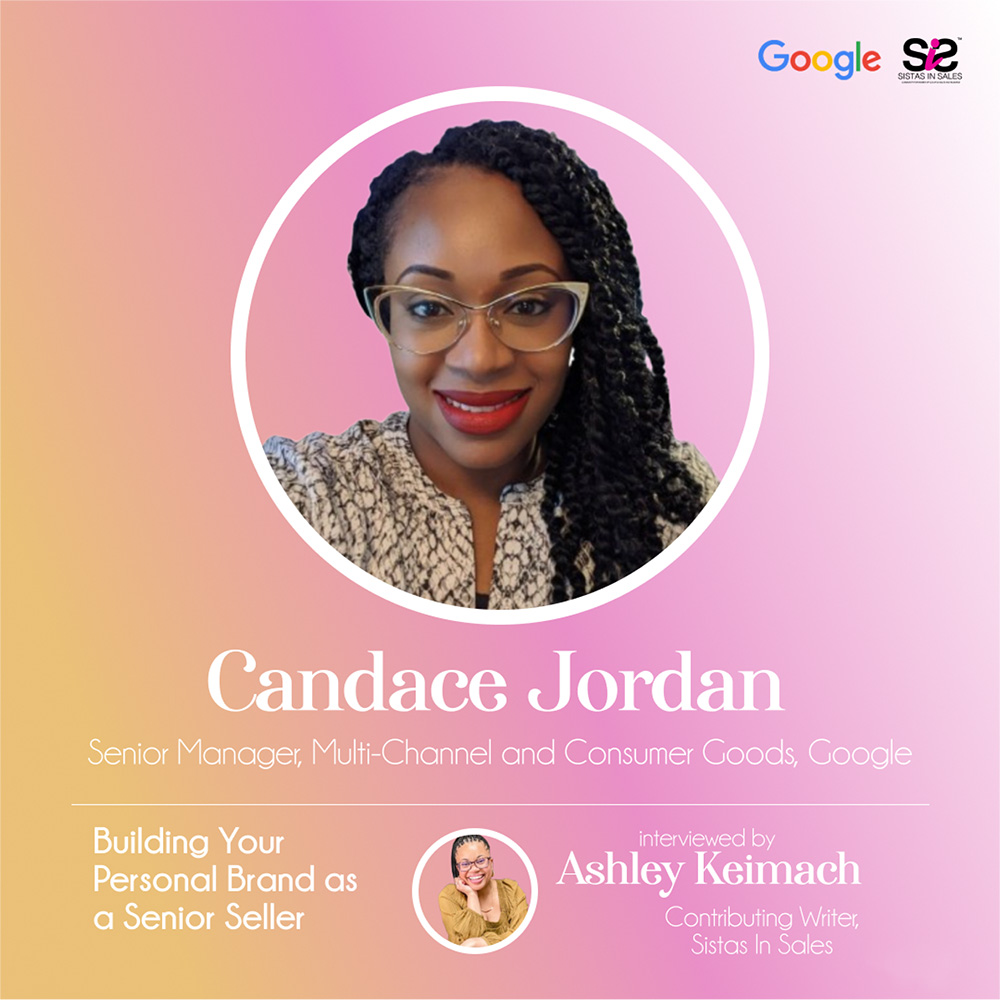
By Ashley Keimach, SIS Contributing Writer Candace Jordan is more than your average sales professional. As a performer at heart, Candace learned early on in her career how to stand out. With over a decade of sales experience, she now works as a Manager for Consumer Goods at Google with a team of 10 sales professionals under her leadership. Undoubtedly Candace has built a career that many young professionals aspire to. But what is it really like to walk in her shoes? How can you climb the corporate ladder, keep up with the demands of a sales career, while still having time to build your own personal brand? In this interview Candace welcomes us into her world, and gives us all a peek inside of what it takes to build a successful career without neglecting your own personal brand and passions. How It Started Before making her mark in tech, Candace started off her career in the entertainment industry as a professional singer. While performing fueled Candace and was a deep passion of hers, she ultimately decided to switch career paths with the goal of finding greater stability. In an effort to find a new lane for herself, Candace decided to go back to school and focus on advertising. Initially, Candace hoped advertising would give her the opportunity to continue flexing her creativity and love for music by writing jingles for commercials. However, Candace quickly found that she was much more interested in the financial side of advertising, which ultimately led to her building a new career in Media Planning. “What I found in all of my courses is that I actually liked managing the money. I didn’t like the creative process as it was too restrictive for me so I ended up in Media Planning where I got to work with brands who basically said ‘here’s what we’re trying to accomplish, here’s how much money we have, tell us what to do with it’ – and I loved it!” Working in Media Planning revealed to Candace her interest in strategy and marketing. It allowed her to be close to her initial love for entertainment while giving her the freedom to build new skills that would eventually open the door to greater opportunities. Through networking, Candace found her next opportunity with Google as a customer service rep. This opportunity eventually led to a transition into sales as an Account Manager. In this role, Candace was able to keep her finger on the advertising world as she worked with advertising agencies, connecting them with google solutions and products that would better serve their clients. As an outsider looking in, it’s easy to see the results of Candace’s hard work without seeing the strategy behind it. When asked how young professionals can take control of their career and break into the sales industry, Candace shares the following insight: “There are a lot of roles that are transferable into sales… When I developed my resume and I wanted to tell the story about what value I would bring into the company and in the role, I talked a lot about my ability to influence stakeholders…” Candace goes on to explain that it’s all about “identifying what’s transferable in your current role and what gaps you need to fill…If you are doing problem solving and influencing stakeholders, or convincing people that a strategy you developed is right for them, you are already selling.” This is precisely what Candace did for herself. Each job opportunity presented new skills and experiences that she was able to leverage to break into new roles and make a positive impact within the sales industry. The work however, doesn’t end there. It’s one thing to aspire to a role like the one Candace currently has – it’s a totally different thing once you land the role. How It’s Going When asked what it’s actually like being a leader at Google, Candace shared the following: “It’s harder than it looks. Good managers spend a lot of time trying to keep the team calm and supported and happy and shield the team from a lot of things that might be going on externally or internally.” But that’s not all. Candace goes on to explain that being a manager also means you have to ensure your team is doing well and performing well. “It can be difficult to navigate so many different personalities and people at different places in their career and levels of expertise.” Despite these challenges, Candace loves the fact that she has a direct role in helping the people on her team develop and grow professionally. “Developing people [and] coaching people is something I have always done, I just wasn’t being paid for it, but it’s important to me.” Candace goes on to share that being a Sales Manager at a major tech company “takes a lot but it’s a labor of love. “I was a very strong seller and contributor…[but learning how] to transfer those skills to others is a new challenge…but it’s very fulfilling.” When asked if someone in a sales position can get better, Candace shared the following perspective: “There is an academic aspect of sales that can 100% be taught. Do the research and come prepared. You can definitely get better at that. You have to pair the concrete side of sales with your own unique personality.” Over the last few years, Candace has worked her way into her current position where she is now leading a team of 10 sales professionals. What started out as a desire to find stability, evolved into a wealth of experience and a beautiful career. Identity and its Challenges in Tech Climbing the ranks at a major tech company and within an industry that has been male dominated for many years is not an easy feat. There are many challenges one might face as they work to build their career, especially if you’re a woman of color. Candace experienced these challenges first hand and it has created a passion
You Belong: How To Share Your Superpower

A Conversation With Microsoft’s Rashida Hodge Meet Rashida Hodge, an executive leader in the AI and emerging technologies space. In this interview, Rashida gives us insight into what it means to bring your authentic self to work, and everywhere else you go. A native of St. Thomas, and a proud Caribbean woman, Rashida believes in the importance of family, and has a wonderful support system in her mother, who is also her best friend. This interview has been edited for length and clarity. Rashida, tell me a little bit about yourself, where you’re from, and how you got where you are. I am from the US Virgin Islands, particularly the island of St. Thomas and I’m a proud Caribbean woman. My mom and dad still live in the islands and I frequently visit. I’m the aunt of six nieces and nephews so I am surrounded by love daily and my mom is my best friend. I like to tell people that my mom is my strength, and my driving force of where I am today. My mom gave birth to me as a teenager. She endured not only her own shock, but the shock of many others, including family and friends. Somehow, through the crushing pressure of small community whispers, internal disappointments and love for me, my mother made the decision to relentlessly persevere despite her circumstances. My mother bore out a resolve that imprinted on me a tenacity and absolute vigor for life. She is my biggest inspiration and I am grateful daily for her sacrifice. Culture is important for Rashida and she is especially proud of her family and her heritage – something many of us can relate to. In addition to her personal culture, work culture is also important. So we talked about culture a little bit and where you’re from. What is the culture like at Microsoft? The culture at Microsoft fits me perfectly – a challenging, learning environment, energized, fast paced, fun, and allows me to do meaningful and impactful work. It’s my family reunion with my extended family daily and we collectively get the opportunity to work with clients to solve their most pressing problems. Work culture is just as important for most people as personal culture, thus finding a company that embodies a culture that resonates with you is key. For some, that may be a company that exudes certain values and for others it may be a company that embraces and supports activities that are important to your ecosystem; or enabling and environment that allows you to thrive. In any case, Rashida supports the idea of embracing your culture and being your full self – inside and outside of the office. I would love to understand what you mean when you say, “bring your authentic self to work.” For the majority of my career, I have operated under the crippling belief that I have to be perfect or damn near perfect to succeed in corporate spaces. I often describe myself as having the perfect trifecta of “the tax”. I’m black, a woman and some say I look young. Basically put, I have paid my fair share of the “black tax”. I often worked twice as hard to get where others are with less effort. I would do things to make myself look less youthful , so people did not think I was unskilled or unqualified for the job. However, overtime, I realized this was the wrong approach and my nuance was my differentiator. If being a unicorn is the main way for women and people of color to access powerful rooms, there’s your reason for why so few of us are in there. Unicorns aren’t real, and it’s unsustainable for that expectation to be placed on us. There are some who are on their journey to bring their authentic selves to work and others who have not even begun. Knowing why it is so important can help those struggling to make a change, take a chance. What would you say to those who are afraid to take your advice and bring their authentic selves to work? Creating a life of not just professional success, but significance requires you to bare your boldness. One of my favorite components of boldness is creating and displaying your own vibe, because it’s basically the brand you carry with you. As mentioned earlier, I am a Caribbean woman, from St. Thomas, US VirginIslands to be more specific. And for many years, I did a good job of tucking away my Caribbean identity from my work identity. I wouldn’t talk about carnival or my rambunctious family. I even got rid of my accent. But, I’ve learned that my vibe is my boldness. I openly talk about my visits home for Carnival. I let my accent slip in and out as I please, and most importantly I share how significant my family is to me. And I hope it doesn’t take others as long to share their vibe, as it did for me. The world needs it. We need everyone to have the boldness to share your quirks, family history and essence. That’s your vibe and your boldness. Speaking of being authentically you and embracing different perspectives and personal nuances, tell me, what does diversity equity inclusion mean to you and what is Microsoft’s stance on this? I was actually on a panel recently for Women’s History Month and one of my peers on the panel said that, “DE&I shouldn’t be an initiative. It shouldn’t be a program. It shouldn’t be a thing. It’s everyday life.” I couldn’t agree more. It is essential and should be embedded in our daily fabric of how we drive belonging and purpose for each person in the workforce. From a Microsoft perspective, our mission is how do we empower every person, every organization on the planet to achieve more? And we certainly want to believe that different perspectives help us all to achieve more on this journey and mission. This is
Pace Setter: How Faith and Freedom Drive Sales Success
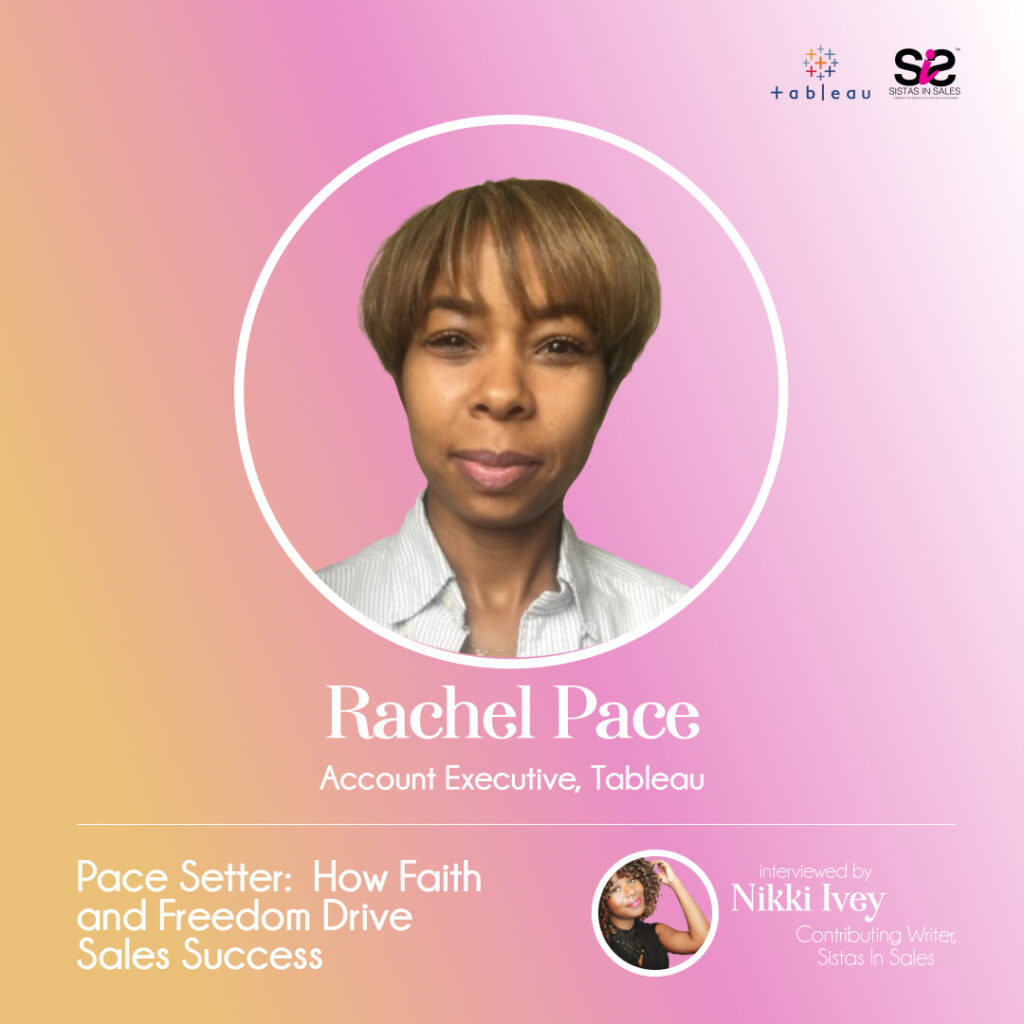
When passion meets purpose, the possibilities are endless. For Rachel Pace, an Account Executive at Tableau, a Salesforce company, those possibilities extend far beyond her day job. A deep desire for personal growth and financial freedom drives her success. That desire and an unshakable confidence have made her accomplished career inevitable. So, was this sales superwoman born or built? According to Rachel, it’s a little bit of both. From Science To Sales Rachel has been an Account Executive at Tableau for six months, focused on Healthcare and Life Sciences. For many people, sales is less something they found and more something they fell into. Rachel’s path was a bit more intentional, but no less unconventional. “As a mechanical engineering student at North Carolina A&T State University, I interned at a major pharmaceutical company where I fell in love with the technical side of medicine. Upon graduation, I accepted a role as a Pharmaceutical Sales rep which was a great fit for me. It allowed me to hone in on the technical side but also be personable and interact with my customers. It just fueled me.” Rachel’s aspirations were inspired by her father, who was a pharmaceutical salesman. His career gave Rachel a front row seat to the fun, freedom and fast pace of a sales career. “The fancy dinners he’d take his clients on, being able to make his own schedule, not being held to an office or a cubicle… Seeing that freedom first hand inspired me to get into the world of pharmaceutical sales.” Rachel took to pharma sales quickly and began making a name for herself. She consistently outperformed her peers, earning her praise and job security throughout the first half of her career. She eventually moved into the world of Maintenance, Repair and Operations in Healthcare but after more than a decade at her previous company, Rachel started to feel like there was something missing: A challenge. While her role afforded safety and job security, Rachel started to feel stagnant and lacked career growth. As complacency threatened to settle in, Rachel realized it was time to exit her comfort zone. She interviewed and started with Tableau, a Salesforce company, focused on enabling companies to see and understand data in new ways. In her new tech sales role, Rachel found the challenge she was looking for. “It feels so good to be reinvigorated and back to a space where it’s like ‘The world of software is so new to me but I know that I can learn and I’m hungry for what it is that they’re trying to teach me.’” Navigating the Nuances Rachel Pace’s achievements are remarkable by any measure. She’s just six months into her role and has already achieved 215% of quota. This is, no doubt, aided by the culture of inclusion she experiences in her role. Her success is also, in part, driven by the impact of seeing others from historically underestimated groups succeed. That representation is one of the first things that impressed her about joining both Tableau and Salesforce. “Seeing Black women represented within Salesforce at both the leadership and managerial levels as well as in my peers is so encouraging.” Rachel also talked about the importance of vetting company culture before coming on board. She suggests asking future team members questions like: 1. How do the company’s stated values align with what you experience?2. Do you feel supported? Are you encountering a glass ceiling? “Being able to have those candid conversations before coming on board was so affirming.” This kind of transparency also helped Rachel feel comfortable showing up as her most authentic self. “It’s inevitable as a Black woman. Yes, we are multifaceted ! I don’t know what else to tell you.” Take The Trip. Leave The Ladder There is much to be impressed with about Rachel Pace’s career success, but perhaps even more admirable is her thoughtful perspective on what truly matters in life. She centers family, spiritual health, and the endeavor to leave the people and places she meets just a little better than she found them. So, what’s next? For many sales people the answer to this question is rooted in career aspirations, but Rachel sees things differently. “I just want the ability to be content with what I have and for my son to be able to experience other cultures first hand.” Rachel emphasizes gratitude as a source of motivation. She is in no hurry to climb the corporate ladder, but being content does not equal being complacent. Rachel is hungry to succeed, but says winning as a seller is less about collecting titles and more about making memories with her son. Achieving her sales goals means more than money. It’s fuel to fund their future without limits. If you’re interested in working with Rachel and the rest of the Tableau team, apply here.
#StrongerTogether: Global Sales Leader Ensuring Work-Life Balance While Driving DE&I Change
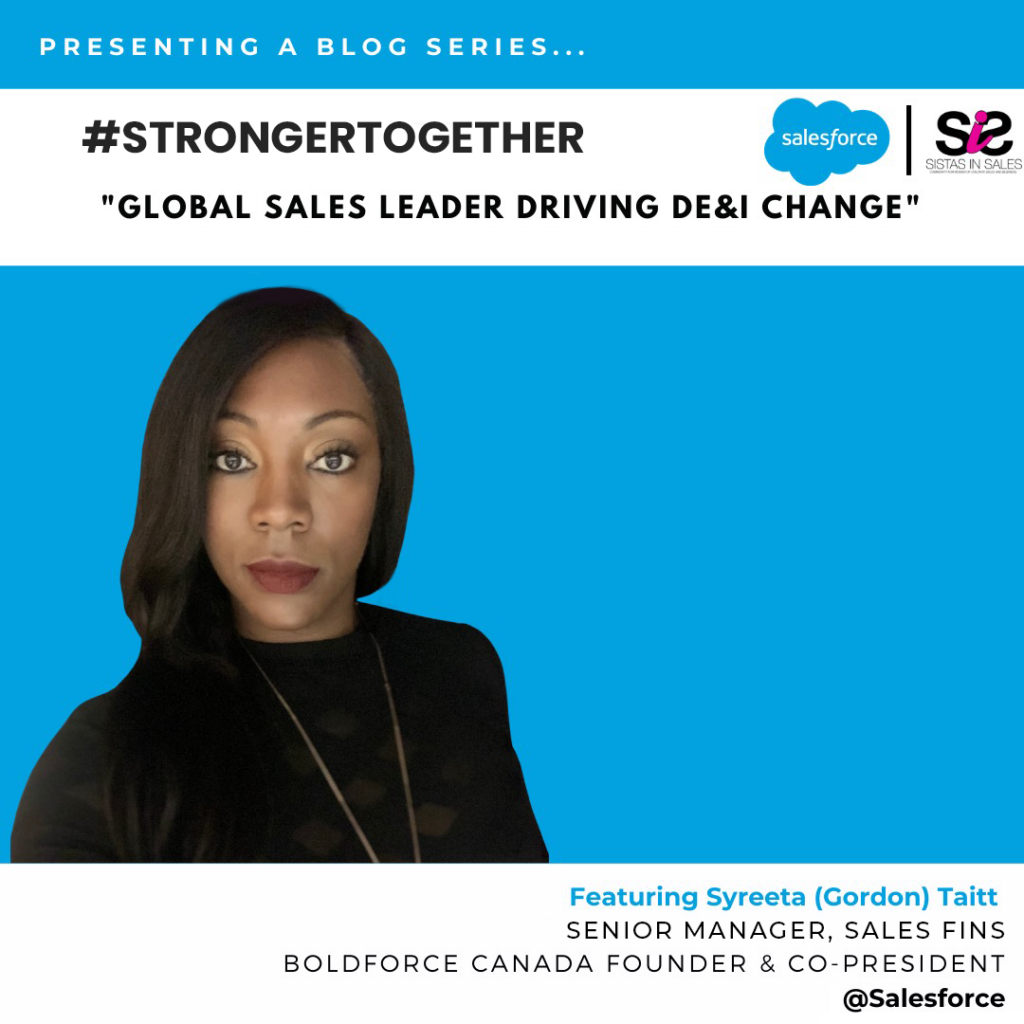
Syreeta (Gordon) Taitt, a Senior Manager, Sales FINS. and BOLDforce Canada Founder & Co-President, shares how her desire to maintain work-life balance has impacted her career journey. She also talks about how her unique global background and experiences helped catapult her career. Check out Syreeta’s insights below to set yourself apart as a professional saleswoman of color. Starting her career as a bilingual data translator, Syreeta saw first-hand how data provides valuable business insights. As a Customer Service Representative, her curiosity and desire to learn more led to a sales role. I asked her to tell us about her entry into sales. I joined a tax and accounting software company to break into a technical role, and that’s where my love for software began. I worked in customer service, answering calls from account executives and customers about their software. I assisted them and described the features and functionalities of the software. I said to myself, “I am fielding these questions from the account executives; what do they do?” I started networking to understand what it means to be in sales. Shortly after, I was promoted to an internal account management role, selling the tax and accounting software. When I moved into property management software and enterprise-style software sales, the company was using Salesforce. Afterwards, Salesforce reached out and asked if I would be interested in interviewing with them. The first time Salesforce reached out, I declined because the timing didn’t work well for me. When the company reached out again with a brand new role, it piqued my interest. The role was for a position in the healthcare and life sciences industry. My grandmother had recently passed away from cancer, so it was interesting to learn more about the U.S. health system and the kind of support that was in place. You were recently promoted from leading an outbound Business Development Representative (BDR) team to now leading a small business FINS Sales team. Can you tell us about your transition into sales leadership and your Global BOLDforce role? I wanted to get into a leadership role and understand more about what it’s like to be a leader at a company. My BDR team was prospecting into organizations to try to uncover opportunities and projects for the account executives. Learn more about our open roles at Salesforce here! What excites me most is seeing the potential of my reps and seeing them realize that potential. I’m positive and always see the best in people. I always try to tell coworkers, direct reports, mentees, friends, etc., “I know that you can get promoted. I know that you can do this job and do it well, and I know you can do the next job well.” But until they believe it, it is not going to happen. The moment you see the switch, when they realize they can do this — that is amazing. It is similar to parenting. You tell your kids many things, repeatedly. You explain, and you try to show them the right way. You hope that they are listening, and then one day they finally turn around, and they say your words back to you or show you, with their own flavor. That is what excites me about leadership and my team. I’m seeing more and more everyday that they’re finding that courage to go above and beyond. It’s all them. I also founded BOLDforce Canada, here in Toronto. BOLDforce, which stands for the Black Organization for Leadership and Development, is a Salesforce Equality group created to expand and empower Salesforce’s Black community. BOLDforce started in the U.S., but there was no presence in Canada. I realized the culture at Salesforce’s Toronto office did not quite reflect the rich diversity of the city. I wanted to make sure there was a safe space for Black and Brown individuals to have conversations and, from a leadership and development standpoint, that they had a support system in place. I have also taken on a global BOLDforce role, in which I support BOLDforce globally from a growth standpoint. In this role, I ask myself: how can I make sure that we are continually retaining our Black employees and growing our number of Black employees, from internships to leadership roles? In general, my work with BOLDforce is to help ensure that there is a space for individuals to feel supported in their daily lives. Learn more about Syreeta’s game changing work with BOLDforce and what it takes to become a successful saleswoman at Salesforce here. Can you tell us more about your unique global background and experience? My background is an interesting one, often referred to as a unicorn for my unique background and experience. I was born in the UK and my parents are Jamaican, so I’m Jamaican through and through. I was raised all over the world — that is where my bilingualism and love of languages comes from. And technology is really just another language. I spent over a decade of my life in Kenya and then another decade in Geneva, Switzerland, and then lived two years in the U.K. I came to Canada to continue my education, and, coming from Switzerland, hospitality was on the top of my mind. I attended Ryerson University in Toronto and studied hospitality and tourism with a minor in communications. I also continued studying French, which I learned while in Geneva. I quickly realized that I was not a fit for the hospitality field. I’m not the type to be working on holidays; I enjoy my holidays and weekends. And, of course, with two kids, it makes a whole lot more sense to have the stability of a Monday-to-Friday role. I believe that a person’s industry and company should support them and their values in all ways, shapes, and forms, whether they are a parent or not. I found that as a mother, I could do sales. During the COVID-19 pandemic, we have seen an increase in the importance of work-life balance. Tell us how you make it work. Growing up,
How Women in Sales are Balancing Work and Family in 2021
Sistas In Sales Joins She Sells Summit
#StrongerTogether: Be the Change Maker
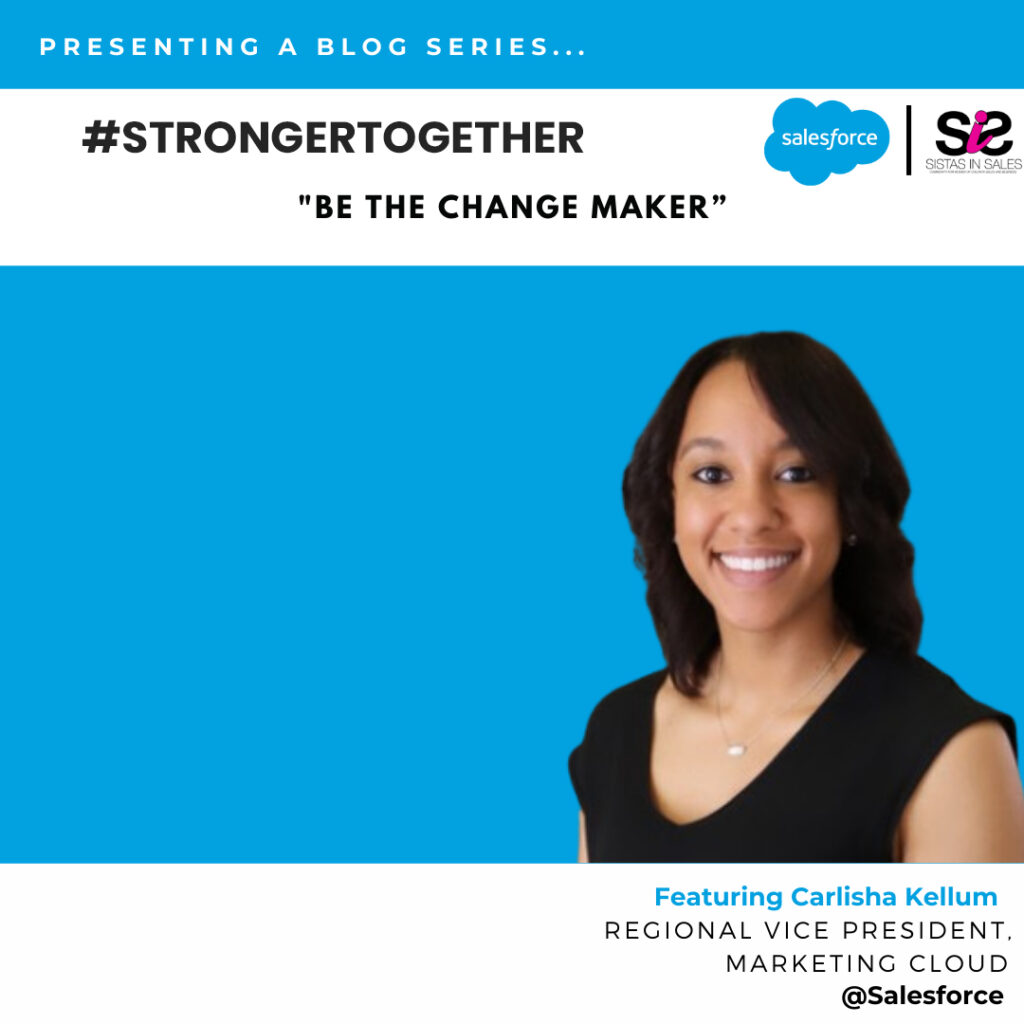
Carlisha Kellum, Regional Vice President, Marketing Cloud at Salesforce | BOLDforce Indy Co-President Carlisha Kellum is a ”Change Maker” who decided early in her career that she could take the lead instead of waiting for someone else to make things happen. I asked Carlisha how she started her career in tech, what makes her a successful sales professional, and how she has driven change. Here’s what she said: Last year you had a record-setting year and exceeded your annual sales quota. You have worn several hats at Salesforce. Tell me about your career journey and what contributed to your success? Last year, I was a Senior Account Executive in the growth business segment for Commercial Marketing Cloud. I sold our digital marketing solutions that enable our customers to effectively reach their consumer base. I had a record-setting year last fiscal, closing about $1.7 million in new and current business across my segment. To give some perspective, that’s 270 percent of my quota. I’ve also been able to work on other projects and take on new responsibilities. When I started out in sales, I found it was a bit challenging to break into the tech industry. Fortunately, a connection from Indiana University posted that Salesforce was growing and looking for new inbound sales representatives at that time. I had zero connections in the tech industry and had to research what makes a good tech sales representative. I started as an inbound representative, or SDR, then I became a business development representative (BDR) doing outbound sales and later moved into an Account Executive role. I try to pass along all the knowledge I have gained including the ways in which I have been successful during my six years at Salesforce, to new folks who come on board. Outside of my day-to-day role, I’m also Co-President of the Black Organization for Leadership and Development—BOLDforce Indy Group. There isn’t much Black or Brown representation in tech, so I appreciate that Salesforce is committed to using their platform to advance the conversation. I was lucky to have a mentor—Chris Roberts, who works at Salesforce in our Toronto office—help me navigate this and ways to get involved. When I first became an Account Executive at Salesforce, I was a bit unsure of where I wanted to take my career. I spent some time working at a smaller partner company before I found myself back at Salesforce with a better understanding of what I wanted out of my career. Learn more about Carlisha’s game-changing work with BOLDforce and what it takes to become a woman in sales at Salesforce. “If I’m going to come back, I’m going to be serious about this.” Upon returning to Salesforce, how did you step into your role as a “Change Maker”? I returned to Salesforce after about six months; I was lucky that I had kept a lot of my connections. When I returned, I said to myself, “If I’m going to come back, I’m going to be serious about this.” My first steps were taking on the role of Co-President with BOLDforce, getting more involved with the Black and Brown communities in Indianapolis, and engaging with Salesforce allies in an impactful way. It took me a while to realize that I was looking for someone else to be a change-maker, the example, the leader. But then I thought, “Why can’t I do that? Why can’t I be the one to reach out my hand to help others?” BOLDforce is working to develop recurring events and ways for allies to get involved. The pandemic has been traumatic for many this past year and we saw a lot of allies at Salesforce step up and become more engaged. A lot of folks raised their hands and said, “I want to help.” And we don’t want that to die down. We want it to be ongoing, so we’re finding ways to engage our network of allies with more information. We recently had an amazing event with The Little Timmy Project, which is a local organization that provides resources to moms and babies in need in Indianapolis, Indiana. We focused on Black maternal health, why Black women are experiencing higher mortality rates than other women during childbirth, and how to advocate for yourself, not only when you’re having a baby but in health care in general. We also partnered this summer with BOLDForce DC on “Coding our Future Summer Tech Camp.” Twenty kids from the Indianapolis community attended this virtual STEM camp to learn about coding and hear from professionals and entrepreneurs in the tech industry. This is a recurring opportunity for young children to get involved early so that when they go to college, they’re already thinking about a potential career in tech. What’s the best career advice you have ever received? The best career advice I ever received was to not try to be like other people. When you want to be a top performer, you look at other people, and you think you should mimic exactly what they are doing. But that’s not necessarily how you’re going to be successful. Find a way to amplify your strengths instead of focusing on what you lack. I’m a lifelong learner and there are always opportunities to continue learning and growing. — CherilynnChief Learning Officer, SIS Cherilynn Castleman, Global Sales Keynote Speaker/Trainer/Executive Coach, has been a sales executive for 20+ years. With her natural talent for teaching and a drive to sell, Cherilynn uses her skills to coach and train other executives and sales professionals. Author of What’s in the C.A.R.D.S.? 5 Post-Pandemic Sales Strategies Sistas in Sales, LLC (SIS) is a community where women of color in sales can network, advance their careers, and most important, find sisterhood. SIS offers events, a thriving Slack community with companies hiring now, and career coaching services. Learn more about Sistas In Sales membership here, or connect with us on LinkedIn, Instagram, Facebook, and Twitter. Sponsored by Salesforce.Learn more about joining Salesforce
